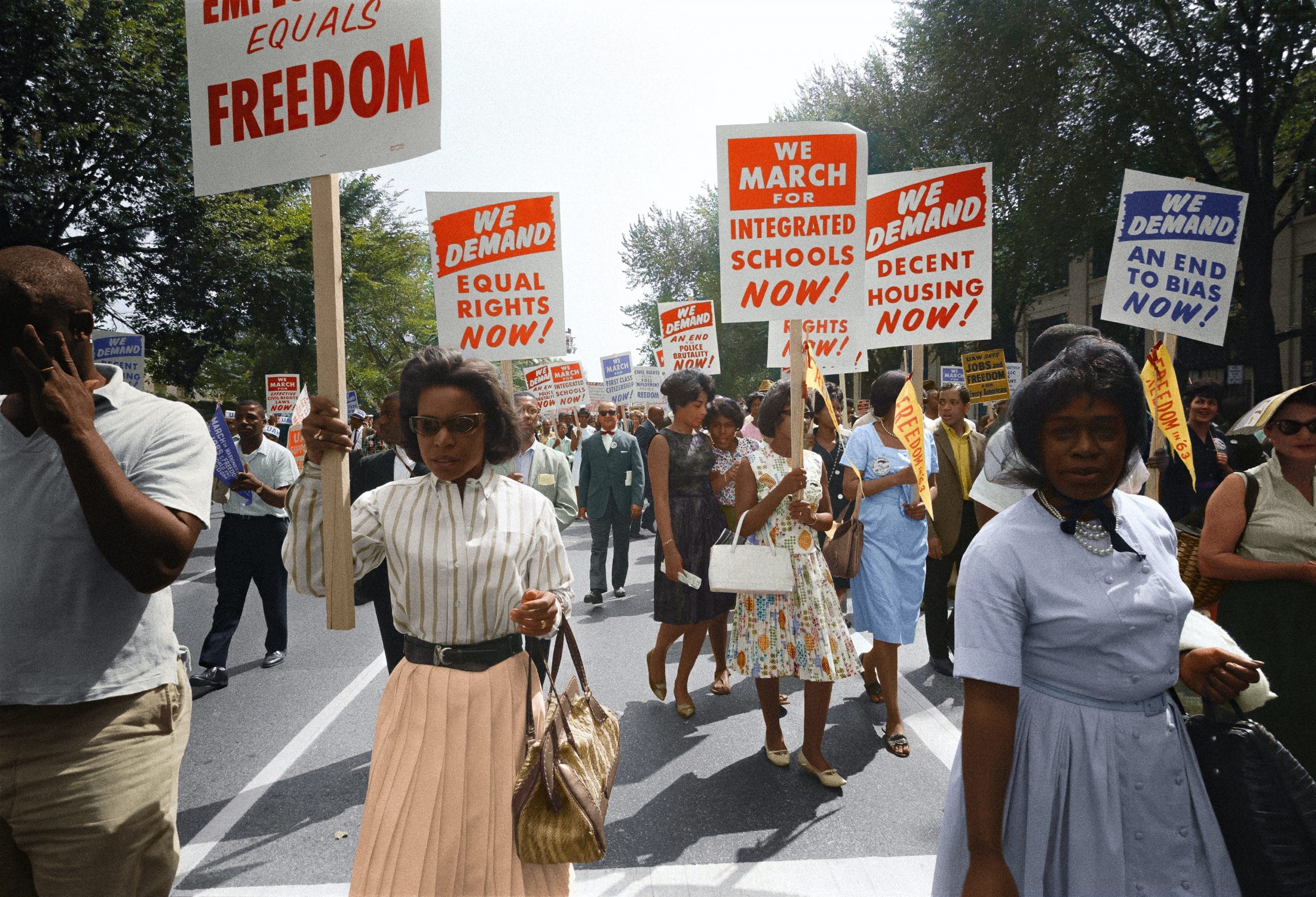(Read Part I here.)
On June 4, 1919, the United States Congress passed the 19th Amendment, granting American women the right to vote and the hypothetical ability to do so. Many states fought this amendment tooth and nail, legally and culturally, to keep almost 70 years of persistent organized labor from its fruit. Twelve states rejected or ignored the amendment and did not ratify it until up to 65 years later (Mississippi in 1984).
In what democratic system can just over half the population be stripped of their power to elect leaders and guide legislation, even as it affects their lives and livelihoods? There’s a complex discussion here around cultural manipulation, power dynamics, and the role of religion, but move on with me for a minute.
This summer, the nation experienced the latest of anguished birth pangs for African-American restorative justice. As a consequence of unavoidable conversations on usually-avoided subjects, even educated, white, adult Americans with privileged backgrounds were learning for the first time what systemic racism has done and is doing to Black Americans. What was interesting was white people’s response.
The innocent child in you that seeks goodness and fairness (and most people seem to have one) might respond to such shocking revelations with outrage on behalf of the wronged. He or she might direct anger at injustice, at deception, at a faulty education, at media that buried ugly truths. Some white people’s inner children responded this way. Others lashed out. They refused this corrective lens. They denied, deflected, minimized, blamed, and mobilized their social media voice against the frightening claims that their view of reality was incomplete and even warped and that their health and wealth was bestowed in part by their race and its cultural implications.
It strikes even middle school students (I know; I’ve taught them) that though the founders of our country had ideas of equality and opportunity, in practice they built a system to serve rich white men, excluding other demographics. As if it were an incremental change, not a revolution, they first freed themselves of the tyranny of monarchy and nobility. Bit by bit, Americans have been incrementally moving closer to a more complete expression of what those founders conceived. Lest I gloss over or minimize, these increments have been hard won with oceans of tears and blood. Like Hebrew prophets, dogged champions invested in victories they would not live to see.
But America is still captive to aristocracy; it just doesn’t look like powdered wigs. It looks like inherited megawealth, tax evasion, white flight, legacy college admission, and simple nepotism. Its tools for keeping power are redlining, predatory lending, voter suppression, poor education, and disfigured religion. There’s more to all this, but you get the idea. For all our national cowboy ethos, the powerful sect is quite comfortable living in an invisible (but increasingly visible) class system which we publicly condemn as Old World and stiff. We are not living honestly.
One reason America has always been so popular with immigrants is they were often leaving systems that allowed little to no mobility. Your grandparents’ life was your parents’ life was your life was your children’s life. The Land of Opportunity presented a chance to walk onto a level field, play hard, and reap rewards.
We all want to believe that’s what we have. There is too much data to the contrary, and our summer of anti-racist education served that data on a dinner plate. I would also posit that perhaps we no longer authentically believe we have that level playing field, and our scarcity fears have fed our recent wave of anti-immigration sentiments; we can’t afford to share what we don’t have.
Because I am unqualified to give prescriptions beyond get informed and vote mindfully (and there is a ton of useful content to read, watch, or listen to out there), I want to focus more on vision. After all, this bleak 4th grade essay is called “What America Means to Me.” I do think it’s possible for us to move toward the ideal and to finally level the playing field for BIPOC, women, immigrants, LGBTQ+ individuals, people of all faiths, people with disabilities, the working poor, the mentally ill, the homeless, the elderly, felons who have served their sentences, and any other qualifier you could stick on an anonymous American avatar.
I believe it starts with a shift in view; we need to recognize the oligarchy and aristocracy profiting from our inattention, and we need to lean into that American spirit that says, “No, thanks, we’re doing something different.” If we could scrutinize our capitalism for cronyism, we could provide more economic opportunity to average people. If we could police our political rhetoric for scapegoating, we could call out discriminatory practices in hiring, housing, immigration, and education. In short, we can be a People of Opportunity.
This is America. Why should someone’s job application be tossed out because their name is in another language or because they show up to the interview in a hijab? Why should an apartment lease be denied to a same sex couple? Why should a working mother be taken off a promotion track? Why should a white man be appointed department head when he is not the most qualified team member?
This is America. Why should poor children have to go to poor schools without resources to develop their potential so they can one day not be poor? Why are some people so afraid of adding affordable housing to well-funded school districts where those children can experience opportunities like rich children, who probably go to private school anyway?
Why should the same crime lock up a Black man for years and a white man for months?
Why should I get to fill out one application and pay one fee to get permanent naturalized citizenship, while a Dreamer has to fill out an application and pay a comparable fee every year just to temporarily float to the bottom of the deportation list? I came here as a minor too at the will of my parents. How are we different?
Why should ineffective elected leaders keep their jobs for decades, lining their pockets and neglecting their public service mandate? Is this democracy?
This is America. We have a long history of slavery, genocide, violence, and oppression. Facing it does not mean losing hope. It’s only in facing it that we can address it and keep making those incremental changes in the right direction. We do this because we believe in us. Patriotism has to have more substance than wearing a flag pin.
The state of Georgia was the first state to reject the 19th Amendment on July 24, 1919. A little over a year later, Tennessee was the 36th state to ratify it, making it federal law. Georgia countered by requiring any woman who wanted to vote in the 1920 general election to be registered for six months prior to the election, an impossible stipulation. But one woman in the state of Georgia voted in November 1920. The Atlanta Constitution reported that Mary Jarrett White had somehow registered on April 1, 1920, and paid her poll tax. She then “calmly witnessed the suffrage tempest.” Talk about patriotism and courage.
She would be followed by an ever-growing number of white female voters, and then Black voters overcoming harassment, intimidation, bureaucratic impediment, lynching, and kidnapping to claim their rights as Americans.
Let’s not forget that we are all still fighting to give every American equal access to the opportunity we consider one of our nation’s foundational values.
(Photo from 1963 civil rights march in Washington D.C.)
Reality Changing Observations:
1. If you feel discomfort when faced with the stories of those who claim injustice and disadvantage, what is the root of that discomfort?
2. When you picture America 30 years from now, what does it look like?
3. Who do you think are the most disadvantaged and excluded people in our nation? What legal protections exist for them, and who speaks on their behalf?






